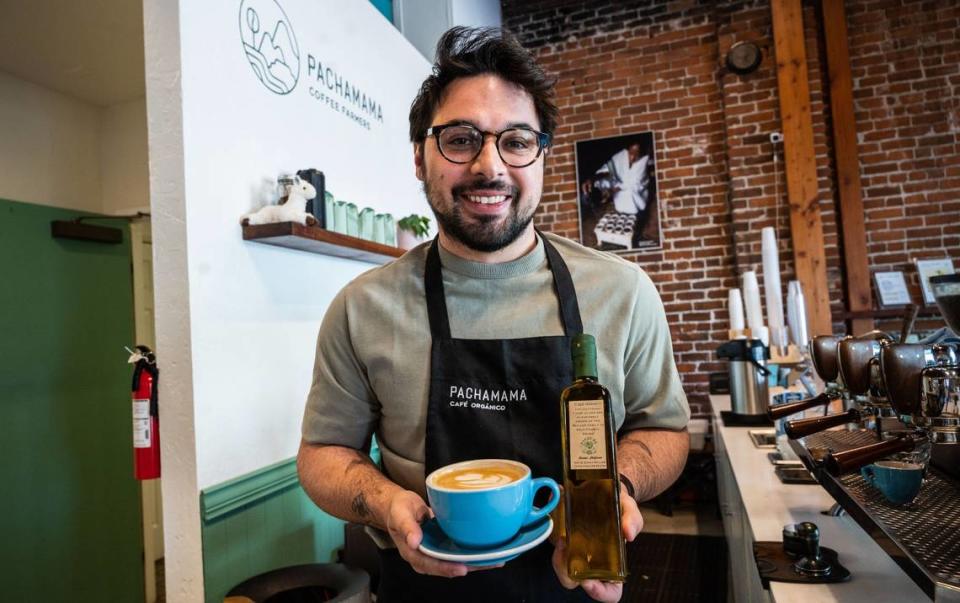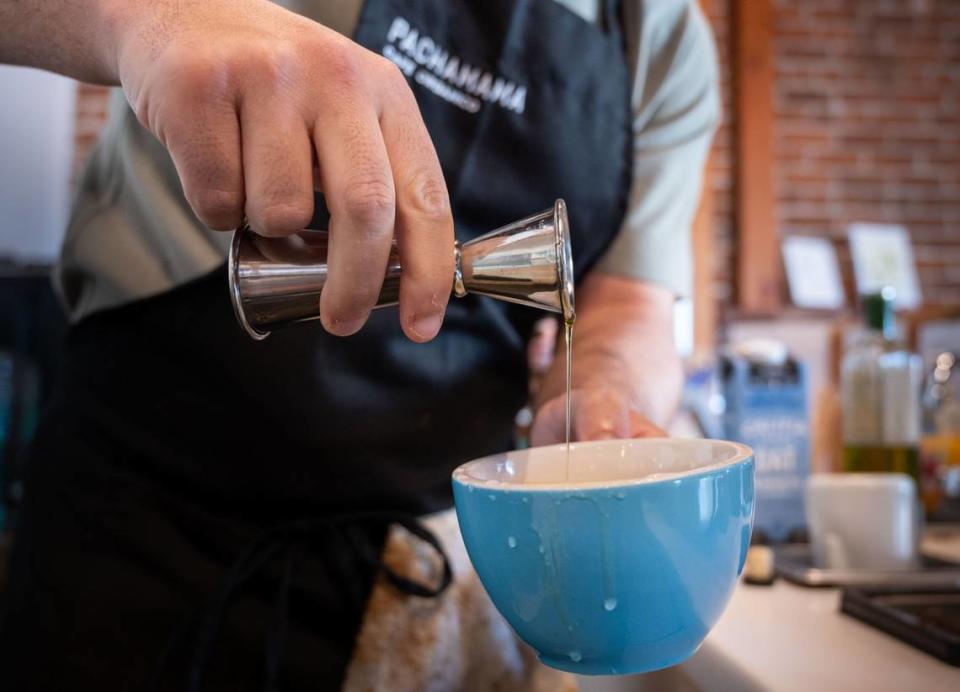Want to try coffee with olive oil? This Sacramento cafe has it, here’s what it tastes like
Starbucks’ new Oleato line of coffee drinks with olive oil has been met with intrigue as well as derision. Only one Sacramento roastery has been brave enough to follow suit with its own version: Pachamama Coffee Company.
Pachamama’s olive oil latte, a seasonal special at all five of the company’s Sacramento-area cafes, was introduced at the end of March and has been an item of interest ever since, said chief retail officer Cruz Conrad.
It’s nutty, rich and a bit bitter, with a mouthfeel that lingers long after swallowing. You can add lavender syrup or honey for a sweeter, more floral taste. And with Starbucks’ Oleato expansion not yet having reached Sacramento, Pachamama is the only coffee shop around to try it.
Pachamama baristas start by pulling two or four shots of Five Sisters espresso, a medium-bodied blend of beans. The name refers to the five countries (Peru, Guatemala, Nicaragua, Mexico and Ethiopia) from which Pachamama sources its beans.


The 200,000 farmers that grow those organic beans also own Pachamama, making it a rare coffee cooperative. In fact, Pachamama’s website states that it was the first U.S. coffee company fully owned and governed by its farmers when it opened in 2006.
Baristas then whisk in a quarter-ounce of Arbequina olive oil from Capay Valley-based Pasture 42, Pachamama’s neighbor at the Davis Farmers Market, for about 15 to 20 seconds. Pachamama sampled a dozen olive oils before settling on Arbequina, a Spanish varietal with a slightly fruity flavor.
“We realized that we wanted to have a certain kind of mouthfeel, a texture and a creaminess that would ultimately not distract from the drink but elevate the drink,” Conrad said.
The customer’s choice of milk (oat milk is the default, because it brings out nutty flavors) is steamed to 135 degrees and poured in to form latte art in the shape of a leaf. You’d hardly know it contained olive oil by appearance, were it not for little yellow bubbles dotting the foam.
I’m admittedly only an occasional coffee drinker, but found Pachamama’s olive oil latte quite enjoyable as a once-in-a-while beverage. It’s a thoughtful take on a somewhat gimmicky concept that uses high-quality ingredients to create a luscious drink. More serious coffeeholics who sampled it with me agreed, and Conrad said that love it or not, most people finish their cup.
And yes, if you’ve been wondering, it is indeed a natural laxative.
Get Sacramento's Food & Drink news delivered to your inbox
Sign up here to receive our free weekly Food & Drink newsletter, written by Bee food reporter Benjy Egel. You'll exclusively receive an early look at restaurants, bars, festivals and more.
What I’m Eating
Caravan Uzbek Cuisine is the Sacramento region’s only eatery dedicated to the foods of Uzbekistan, a Central Asian nation of 35 million people. Far from the heart of Sacramento and with no seating, this North Highlands halal food truck needs to be intentionally sought out.
Couple and owners Farkhod Soatov and Aziza Ibragim grew up in Uzbekistan’s capital city of Tashkent, then immigrated, moved to Sacramento and opened Caravan in a lot near the corner of Watt Avenue and Elkhorn Boulevard in 2020.
Uzbek food shares some similarities with Afghan or Persian cuisines, with influences from Silk Road trade and centuries of Russian/Soviet control. Grains and meat dominate the landlocked country’s culinary landscape, though pork is rare because most people are Muslim.
Caravan only serves five items when fully stocked, and the truck was sadly out of kebabs (chicken, ground lamb or shish kebabs) and kazan kebabs (a lamb-and-potato Uzbek dish) on my visit. I was most disappointed not to try lagman, a hearty beef noodle stew.
Uzbekistan’s national dish, pilaf ($12, also known as plov), was available. Spiced long-grain rice formed a base for soft garbanzo beans, sweet roasted carrots, raisins and fatty beef fried in a manner similar to carnitas.
The other option was shawarma ($10), with a choice of shaved beef, chicken or lamb to go inside cross-hatched grilled pita. Ask for a side of the creamy orange housemade hot sauce with a quick kick; it’ll brighten up the cabbage/cucumber/bell pepper slaw inside the wrap.
Caravan Uzbek Cuisine
Address: 3525 Elkhorn Blvd., North Highlands.
Hours: 12-8 p.m. Monday through Saturday, closed Sunday.
Phone number: (916)860-7777.
Website: https://www.instagram.com/caravangoodfood.
Drinks: Canned sodas.
Animal-free options: None.
Noise level: No seating; road noise moderately high, if you choose to enjoy your food on-site.
Openings & Closings
The Mimosa House opened its second Folsom location last Friday, this one at 1002 Riley St. in Walmart Central shopping center. The popular brunch spot also has a restaurant at 25075 Blue Ravine Road, plus other locations in East Sacramento, Rancho Cordova, Roseville and Gold River.
Nour’s Cafe recently opened at the corner of Manzanita and Madison avenues in Carmichael. Eye-catching menu items at the ornate Middle Eastern cafe include Turkish coffee, loaded waffles and hand pies called moajanat.
South Land Park dim sum haven Hong Kong Islander is closed indefinitely after a fire on April 14, owner Kandy Lau told me in a text message. Almost half the Chinese restaurant burned down, she said.

